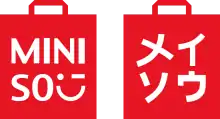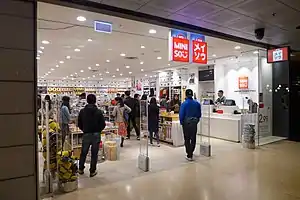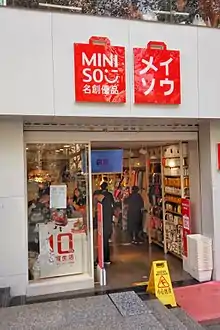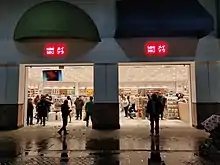Miniso
Miniso (simplified Chinese: 名创优品; traditional Chinese: 名創優品; pinyin: Míngchuàng Yōupǐn; Hepburn: Meisō Yūhin; stylized MINISO) is a Chinese[1] low-cost retailer and variety store chain that specializes in household and consumer goods including cosmetics, stationery, toys, and kitchenware.[3] The company is headquartered in Guangzhou, Guangdong[4] under their Chinese holding company Aiyaya.[5] In 2016, the company's sales revenue reached $1.5 billion.[2] In March 2019, Miniso began a collaboration with Marvel Entertainment to sell its branded products.[6]
 | |
 | |
Native name | 名创优品 |
|---|---|
| Type | Public |
| NYSE: MNSO | |
| Industry | Variety store |
| Founders |
|
| Headquarters | , China |
Area served | Worldwide |
| Revenue | |
| Website | miniso |
Miniso has been criticized as a "copycat" for sharing an aesthetic similarity to other Japanese variety stores such as Uniqlo, Muji and Daiso, as well as for being a Chinese retailer that markets itself as Japanese.[7][8][9][10] Even so, Miniso has expanded outside of the Chinese market and operates 1,800 stores in Asia, Europe, Oceania, Africa, North America, and South America.[11]
History
Miniso was founded in August 2009 by a Chinese entrepreneur Ye Guofu.[1] Miniso's first store opened in China in 2013.[12] The company claims that Japanese designer Miyake Junya co-founded Miniso,[13] although local media reports in China and Japan have questioned Junya's existence.[14][15][16] Initially claiming to be a famous Japanese brand, despite operating in Mainland China under Chinese company Aiyaya and had no outlets in Japan.[17] Miniso has since expanded outside of China and opened over a thousand stores worldwide.[11]
In January 2017, Miniso announced that they were seeking to enter the North Korean market, opening their first store in Pyongyang four months later. According to The Economist, the store was popular among the country's wealthy but only accepted foreign currency, including the U.S. Dollar, Chinese Yuan, and Euro as payment.[2] Soon after opening, the company's Japanese branch came under pressure for violating United Nations Security Council Resolution 2321 prohibiting trade with North Korea, distanced themselves from the move, and blamed the Chinese offices for the decision.[18] As a result of the controversy, Miniso promised not to ship any more products to North Korea and the Pyongyang store was rebranded as "Evolution".[19][20]
Expansions and locations


Miniso first established a retail presence in China, and the majority of its stores still operate there. Even so, it has pursued an aggressive expansion plan in countries connected with China's One Belt One Road economic policy, alongside other similar international retailers like Mumuso,[21] XIMIVOGUE and LÄTT LIV, with shopping malls sometimes having several rival stores.[22] It first began expanding in Asia: Taiwan, Hong Kong, Cambodia, Nepal, Macau, India, Pakistan, Mongolia, South Korea, North Korea, Indonesia, Malaysia, Singapore, Vietnam, Sri Lanka, the Philippines, Thailand and Bangladesh.[2][11] Sales in one store in Vietnam on its opening day exceeded $10,000 in one hour.[23] Miniso's store in Pyongyang was the first and only foreign-branded chain store in North Korea.[2] It arrived in Australia in early 2017.[24]
On 27 May 2016, Miniso opened its first store in Seacon Square Srinakarin, Bangkok that Operating under the name of MiniSo (Thailand) Company Limited which Singtai Trading Company Limited is the sole importer. Currently, in Thailand, Miniso has a total of 52 branches nationwide.[25]
In North America, Miniso currently operates several stores in Canada, the U.S., and Mexico.[26][27] On August 6, 2016, Miniso signed a Comprehensive Strategic Cooperation Agreement with an American partner to expand its retail operations to the United States.[28] The first U.S. store opened in Pasadena in April 2017.[29]
In Central America, Miniso opened its first store in Panama. They had opened 4 stores by October 2018.
In South America, Miniso opened its first retail store in Brazil in August 2017, its second in Chile in December 2017, with plans to enter nearby Argentina soon.[30] In May 2018, its first retail store in Peru was opened at Jockey Plaza Shopping Center. In Colombia it started operations with a double opening of two stores on August 30 in the city of Bogotá, by December 2018 they plan to open the first 15 stores in the country.
In Europe, Miniso operate retail outlets in Spain, Germany, Italy, Estonia, Serbia,[31] Armenia[32] and Russia, among others.[11]
In Africa, Miniso first entered Morocco in early 2017 with 15 stores in multiple cities around the kingdom, South Africa in August 2017[33] and West Africa in Nigeria one month later.[34] There are also stores in Kenya and in Kampala, Uganda.[35][36][37] As of January 2018, Miniso operates two stores in Egypt.
On September 1, 2018 Miniso opened two stores in Romania and plans to open 40 more stores nationwide.[38]
On January 12, 2018 Miniso opened its first store in Bangladesh.
In June 2019, Miniso announced it would open 6 more stores in Israel bringing the total to 18 by the end of the year.[39]
On 8 November 2019, Miniso opened its first store in United Kingdom, in Ealing Broadway, west London.
As of January 2020, Miniso has over 3,500 stores in 79 countries, with an approximate revenue of US$2.4 billion in 2019.[12]
Marketing
While Miniso is a Chinese company, its products are heavily influenced by Japanese design.[1] Miniso's marketing strategy has been compared to Japanese retailers such as Muji and Uniqlo due to similarities in both store aesthetics, brand design, and inventory.[13][40] Because of its Japanese-influenced branding strategy, the company's products have been criticized as "made in China to look Japanese",[5][41] particularly when most of the company's stores are located in China, where people trust Japanese brands more than domestic offerings.[3] It has also been criticized for affixing grammatically incorrect Japanese-language labels to many products, a consequence of using Baidu Translate to produce Japanese language copy, as admitted by Miniso management.[3][17]
Nevertheless, because of Miniso's success in expanding its number of retail stores, AllianceBernstein, a global asset management company, called its market strategy a success by "filling a price-point niche left unaddressed by the Japanese formats it was imitating".[17]
References
- "Miniso Group Holding Limited, Amendment No. 1 to Form F-1 Registration Statement". US Securities and Exchange Commission. October 7, 2020.
- "A trendy Asian lifestyle chain opens in North Korea". The Economist. June 22, 2017. Retrieved August 21, 2017.
- "MINISO going places despite Muji copycat charge". Hong Kong Economic Journal. June 10, 2016. Retrieved January 3, 2017.
- "Japanese people surprised to find that "popular Japanese store" Meiso doesn't exist in Japan". SoraNews24 -Japan News-. 2014-04-23. Archived from the original on May 23, 2018. Retrieved 2019-07-02.
- "Is Miniso a Japan-based chain store?". Macau Daily Times. January 26, 2016. Retrieved January 3, 2017.
- "MINISO". www.miniso.com. Retrieved 2021-01-15.
- Crystal, Tai (2018-11-05). "Miniso far, Mumuso good: how China's 'cultural copycats' took over the world". South China Morning Post. Retrieved 2020-08-27.
- MARIMI KISHIMOTO; KYOMI KATSUNO (2018-12-28). "Muji, Japan's 'no brand' brand, battles copycats in China". Nikkei Asian Review. Retrieved 2020-08-27.
- Lisa Du; Grace Huang (2019-07-16). "Muji's Minimalist Aesthetic Is Too Easy to Knock Off". Bloomberg. Retrieved 2020-08-27.
- Amresh, Anbalagan (2018-02-01). "Uniqlo, Muji & Daiso all in one, but Chinese?". The Low Down. Retrieved 2020-08-27.
- "Stores around the world". Miniso. Archived from the original on March 9, 2015. Retrieved January 3, 2017.
- "The Miniso Story: How a "Muji Copycat" Became an Innovative Retail Giant". RADII | Culture, Innovation, and Life in today's China. 2020-01-07. Retrieved 2020-04-16.
- Woo, Alyssa (January 14, 2016). "Miniso is Japanese, say founders". Strait Times. Retrieved January 3, 2017.
- "Miniso far, Mumuso good: how China's 'cultural copycats' took over the world". South China Morning Post. November 5, 2018.
- "宣称100%日本品牌,"名创优品"被曝商品大多中国制造" (in Chinese). The Paper. September 13, 2015.
- "日本風中国企業「名創優品」が突きつけるもの" (in Japanese). Nikkei Business. September 19, 2019.
- "Emerging Market Game Changers: From Copycats To Top Dogs". ValueWalk. September 16, 2016. Retrieved January 3, 2017.
- Takahashi, Kosuke (June 16, 2017). "Miniso shop in Pyongyang could breach UNSC resolutions: Japanese expert". NK News. Retrieved November 8, 2017.
- O'Carrol, Chad (August 21, 2017). "Pyongyang's "Miniso" store rebrands amid increased scrutiny". Retrieved November 8, 2017.
- 平壌の元ミニソウが進化となり観光客もショッピングできるように. KoreaWorldTimes (in Japanese). 2019-01-01. Retrieved 2020-09-25.
- Guatemala Embassy (August 4, 2018). "Mumuso is not Korean brand and they are originated from China". MOFA, Korean Gov.
- Liu, Visen (June 28, 2017). "This Muji-like Chinese chain is expanding in the US—and North Korea". Quartz. Retrieved November 8, 2017.
- "Spectacular Scene of MINISO's Three Stores Opened in Vietnam". Yahoo Finance. September 28, 2016. Archived from the original on January 4, 2017. Retrieved January 3, 2017.
- Cummins, Carolyn (February 17, 2017). "Miniso the latest retailer to disrupt the Australian market". Sydney Morning Herald. Retrieved November 8, 2017.
- https://workpointnews.com/2019/09/29/miniso-secret/
- Dhopade, Prajakta (November 18, 2017). "How Miniso might just be a Dollarama disruptor in Canada". Maclean's. Retrieved October 30, 2017.
- "LA JAPONESA MINISO ESTIMA ABRIR 150 TIENDAS EN MÉXICO" (in Spanish). Expansion. March 6, 2017. Retrieved November 8, 2017.
- "MINISO Signs Comprehensive Strategic Cooperation with U.S. Representative to Enter American Retail Market" (Press release). PR Newswire. September 1, 2016. Retrieved January 3, 2017.
- "Miniso Japan to Open First U.S. Store in Pasadena". Pasadena Now. April 5, 2017. Retrieved November 8, 2017.
- "Miniso, maior rival da Daiso, abre primeira loja no Brasil" (in Portuguese). Veja. August 31, 2017. Retrieved November 8, 2017.
- "Otvorena prva radnja japanskog lanca Miniso u Srbiji - TiMP portal". TiMP portal (in Serbian). 2018-05-17. Retrieved 2018-08-06.
- Steyn, Gabriella (August 8, 2017). "Japanese Fashion and retail brand MINISO takes on SA". Retrieved November 8, 2017.
- "MINISO to open new shops in Nigeria". Vanguard. August 30, 2017. Retrieved November 8, 2017.
- https://www.businessdailyafrica.com/corporate/companies/Japan-s-Miniso-opens-shop-at-Nairobi-malls/4003102-4259142-view-asAMP-14ss2l6/index.html
- "Japan expands presence in Kenya's retail market with MINISO Lifestyle". The Exchange. 2018-06-11. Retrieved 2019-02-15.
- "Blogkla | Kampala City Blog". Blogkla | Kampala City Blog. Retrieved 2019-02-15.
- "Retailerul japonez Miniso a deschis primul magazin în România. Unde şi când le deschide pe următoarele două". www.economica.net (in Romanian). 2018-09-05. Retrieved 2018-09-21.
- "Japan's Miniso to open 6 more Israeli stores". Globes. Retrieved 3 July 2019.
- "被指抄襲 名創優品:「首席設計師是日本人」" [Accused of plagiarism, Miniso responds that their head designer is Japanese] (in Chinese). HKET. July 6, 2015. Retrieved January 3, 2017.
- Tomiyama, Atsushi (October 17, 2016). "Japanese disguise helps sell 'Made in China' in Vietnam". Nikkei Asian Review. Retrieved January 3, 2017.
